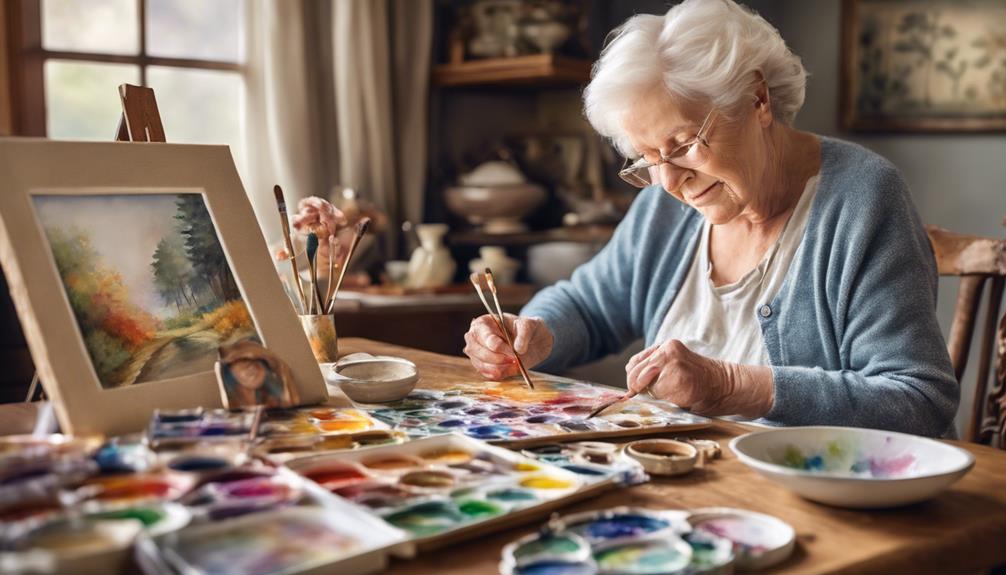As we face the difficulties of caring for family members with dementia, we frequently find moments of happiness and closeness despite the challenges. Finding successful methods to interact with dementia patients at home can be fulfilling and healing.
From simple sensory experiences to interactive games and creative projects, the possibilities are endless. By exploring a variety of activities tailored to individual preferences and abilities, we can unlock hidden potentials and foster a sense of purpose in those we care for.
Key Takeaways
- Nature walks and sensory activities boost well-being and engagement.
- Cognitive stimulation through yoga, puzzles, and dance aids memory and function.
- Emotional well-being enhanced by music therapy, art, and storytelling.
- Social interaction vital with outdoor walks, storytelling, and simple games.
Outdoor Nature Walks
Let's embark on rejuvenating outdoor nature walks, a soothing and enriching activity for dementia patients. These walks offer more than just physical exercise; they provide valuable sensory stimulation through the gentle rustling of leaves, the chirping of birds, and the sight of vibrant flowers. For individuals with dementia, these sensory experiences can evoke memories, spark joy, and improve overall well-being.
Research shows that walking in nature can significantly reduce stress, anxiety, and depression in dementia patients. The exposure to green spaces during these walks has the power to elevate mood, enhance cognitive function, and create a sense of tranquility. Additionally, outdoor nature walks present opportunities for social interaction, fostering connections with caregivers, nature, and fellow walkers.
Engaging in outdoor activities, such as nature walks, not only enhances the quality of life for dementia patients but also promotes a sense of calm and relaxation. These walks enable individuals to connect with the environment, appreciate the beauty of nature, and experience moments of peace and contentment.
Indoor Sensory Activities

Let's explore how we can stimulate the mind, engage the senses, and promote relaxation through indoor sensory activities for dementia patients.
By providing opportunities to feel different textures like silk, burlap, wool, and linen, we can offer a multi-sensory experience that enhances cognitive stimulation.
Engaging in activities such as sorting wooden beads by shape can bring about a sense of calm and focus, contributing to the overall well-being of individuals with dementia.
Stimulating the Mind
Engaging in sensory activities at home can provide valuable stimulation for dementia patients, enhancing their cognitive skills and overall well-being. Stimulating activities such as aromatherapy to awaken the sense of smell or creating sensory bins with various textures like rice and beans can offer a sense of accomplishment and engagement.
Meaningful activities like listening to calming music can reduce anxiety and promote relaxation, benefiting both the mind and spirit. For a visual and auditory experience, virtual reality nature walks can transport individuals to peaceful settings, fostering cognitive functions and a sense of well-being.
Engaging the Senses
Exploring different sensory activities indoors can offer valuable cognitive stimulation and relaxation for dementia patients, enhancing their overall well-being and quality of life.
Sensory activities like aromatherapy, music therapy, and tactile experiences can play a significant role in engaging the senses of individuals with dementia. Aromatherapy hand massages or diffusing calming scents can create a soothing atmosphere, while listening to familiar music can evoke positive emotions and memories.
Tactile experiences such as touching different textures or engaging in sensory bins filled with various materials can provide both stimulation and comfort. These indoor sensory activities not only help reduce anxiety but also promote a sense of calmness and improved well-being, making a meaningful impact on the lives of dementia patients.
Promoting Relaxation
How can we create a serene and comforting environment through indoor sensory activities to promote relaxation for dementia patients at home? Indoor sensory activities like aromatherapy, music therapy, and relaxation techniques can help in calming and reducing stress for individuals with dementia. Engaging in activities such as sensory bins, guided meditation, and progressive muscle relaxation can offer soothing experiences. To enhance relaxation, consider creating a spa-like ambiance with soft lighting, calming music, and aromatherapy scents. Incorporating sensory stimulation through mindful coloring, hand massages using scented lotions, and nature sounds can help promote relaxation. The table below highlights some indoor sensory activities that can create a peaceful and comforting atmosphere for dementia patients at home.
| Sensory Activities | Relaxation Techniques | Benefits |
|---|---|---|
| Aromatherapy | Guided Meditation | Calmness and stress reduction |
| Music Therapy | Progressive Muscle Relaxation | Soothing experiences |
| Mindful Coloring | Nature Sounds | Sensory stimulation |
Memory Scrapbooking

Memory scrapbooking offers a creative and personalized way for dementia patients to reminisce and connect with their past experiences. It involves compiling memory books with photos, mementos, and captions, providing visual cues that can stimulate reminiscence.
Engaging in memory scrapbooking not only helps individuals recall significant events and people from their past but also has cognitive benefits. This activity can enhance cognitive function, boost mood, and instill a sense of achievement in those with dementia.
Kitchen Baking Sessions
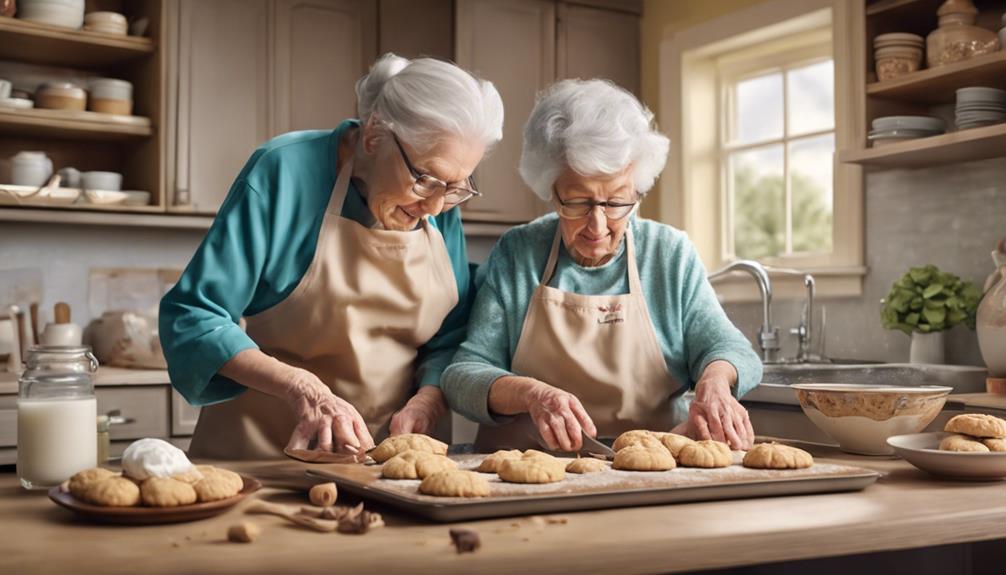
Engaging in kitchen baking sessions can offer sensory stimulation and cognitive engagement for dementia patients at home. Baking cookies or simple recipes can bring a sense of accomplishment and engagement in a familiar activity, fostering a feeling of joy and purpose.
Here are a few ways in which baking can benefit dementia patients:
- Creating Memories: The act of smelling, touching, and tasting different ingredients can evoke past memories, sparking conversations and moments of reminiscence.
- Enhancing Cognitive Abilities: Following step-by-step instructions in baking can help support cognitive functions, providing mental stimulation and a sense of achievement.
- Social Interaction: Baking together can create opportunities for social connections with caregivers or family members, promoting a sense of togetherness and bonding.
- Sensory Stimulation: The sensory experience of baking can be comforting, engaging the senses of smell, touch, and taste, which can be particularly beneficial for individuals with dementia.
Family Picture Sorting
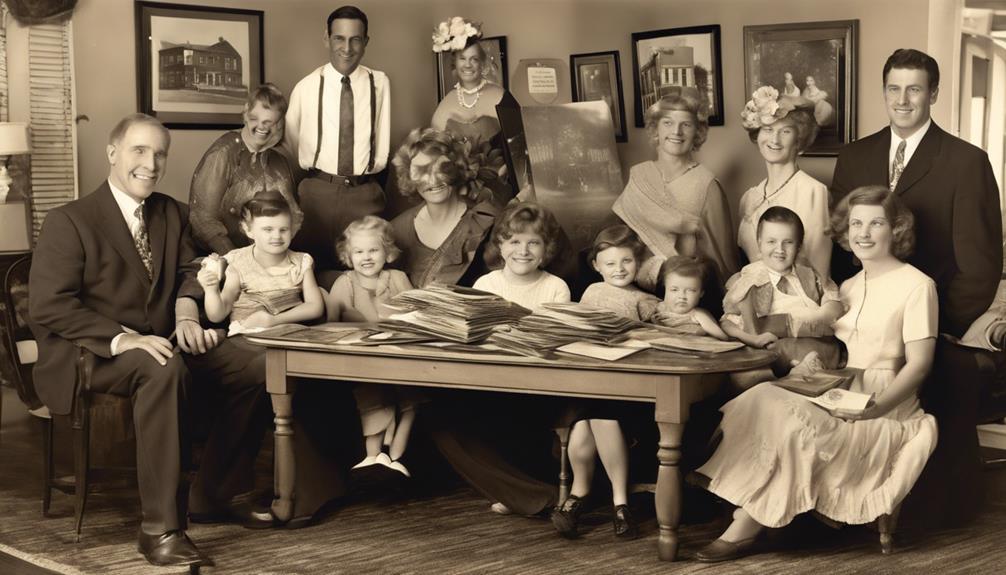
Sorting through family pictures provides a meaningful opportunity for dementia patients to reminisce about cherished moments and reconnect with familiar faces. Organizing these photos can stimulate cognitive functions, triggering memories of loved ones and past events.
As they sift through the pictures, emotions may surface, leading to conversations about shared experiences. This activity not only promotes memory recall but also encourages social interaction and storytelling.
Engaging in sorting family pictures can bring a sense of accomplishment and joy to dementia patients, fostering a positive atmosphere. The act of reminiscing through family photos allows individuals to feel connected to their history and loved ones, even if specific details may be challenging to recall.
Through this simple yet powerful activity, caregivers and family members can help create a warm and comforting environment that nurtures the patient's emotional well-being and sense of belonging.
Music Therapy Sessions

We understand the importance of music therapy sessions for dementia patients at home. These sessions can bring about a sense of calm, trigger positive memories, and create a space for emotional expression.
Choosing appropriate music tailored to the individual's preferences can enhance the effectiveness of the therapy.
Benefits of Music Therapy
Indisputably, music therapy offers significant benefits for dementia patients, enhancing mood, social interaction, and cognitive function. Engaging in music therapy sessions can have profound effects on individuals with dementia, improving various aspects of their well-being.
Here are four ways in which music therapy can positively impact the lives of dementia patients:
- Mood Enhancement: Music therapy has the power to uplift spirits, bringing joy and happiness to individuals with dementia.
- Memory Stimulation: Through music, memories can be triggered, aiding in memory recall and stimulating cognitive function.
- Stress Reduction: Music therapy promotes relaxation, reducing stress levels and creating a calming environment.
- Quality of Life Improvement: By reducing challenging behaviors, enhancing communication, and fostering meaningful experiences, music therapy contributes to an overall improvement in quality of life for dementia patients.
Choosing Appropriate Music
When selecting music for music therapy sessions with dementia patients, it's crucial to choose familiar songs that resonate with their personal history and preferences to maximize therapeutic benefits. Engaging in active listening and encouraging participation through singing, dancing, or playing simple instruments during these sessions can enhance the experience.
Music has the power to evoke memories, stimulate emotions, and promote social interaction, creating a holistic and enriching experience for individuals with dementia. By incorporating familiar music into daily routines, we can provide comfort, relaxation, and a sense of well-being for those living with dementia.
Gentle Yoga Exercises
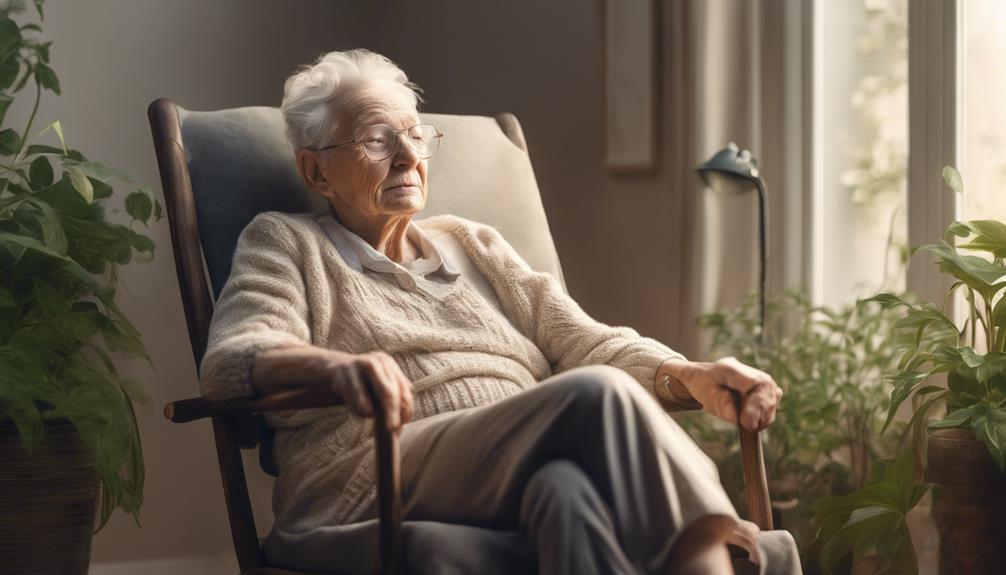
Engaging in gentle yoga exercises at home can significantly enhance the well-being and cognitive function of dementia patients. Here are some key points to consider when incorporating gentle yoga into the routine of dementia patients:
- Improving Physical Well-being: Gentle yoga exercises can help improve flexibility, balance, and overall physical health in dementia patients, contributing to a better quality of life.
- Reducing Stress and Anxiety: Yoga activities promote relaxation, reduce stress, anxiety, and depression, fostering a sense of calm and tranquility.
- Enhancing Cognitive Function: Simple yoga poses tailored for seniors with dementia can enhance cognitive function and aid in memory recall, providing mental stimulation.
- Boosting Mood and Sleep Patterns: Regular engagement in gentle yoga can boost mood, increase circulation, and improve sleep patterns, contributing to a more positive outlook on life.
Incorporating gentle yoga into the daily routine of dementia patients can offer a holistic approach to their well-being, addressing both physical and mental health needs.
Painting and Coloring

Painting and coloring provide a therapeutic and creative outlet for dementia patients to express themselves artistically and engage their senses. These activities offer more than just a chance to create; they can also stimulate sensory experiences, promote relaxation, and enhance emotional well-being. For individuals with dementia, using simple painting techniques and larger brushes can make the process more manageable and enjoyable. Similarly, coloring activities, such as those found in adult coloring books, can help improve focus, concentration, and fine motor skills.
When engaging dementia patients in painting and coloring, consider incorporating a variety of colors and textures to enhance sensory stimulation. These elements can make the experience more immersive and enjoyable for the individual, fostering a sense of accomplishment and self-expression. By encouraging participation in these creative activities, caregivers can provide a meaningful and fulfilling outlet for dementia patients to connect with their emotions and memories through art.
Gardening Together

Gardening together can be a rewarding and therapeutic activity that fosters connection and joy for dementia patients and their caregivers. Engaging in gardening provides sensory experiences and offers numerous therapeutic benefits. Here are some ways to make the most out of gardening with dementia patients:
- Raised Mobile Gardens: Set up raised mobile gardens to make it easy for patients to access and maintain their garden beds, facilitating their active participation.
- Plant Edible Plants: Choose plants like strawberries and herbs for their sensory appeal. Encouraging patients to plant and care for edible plants can enhance their engagement and enjoyment.
- Individual Gardening Patches: If space allows, provide individual gardening patches. Personalized involvement can boost patients' sense of ownership and accomplishment.
- Therapeutic Benefits: The combination of fresh air, tactile experiences, and the nurturing of plants can have a calming effect on dementia patients, improving their mood and reducing stress levels.
Storytelling Sessions
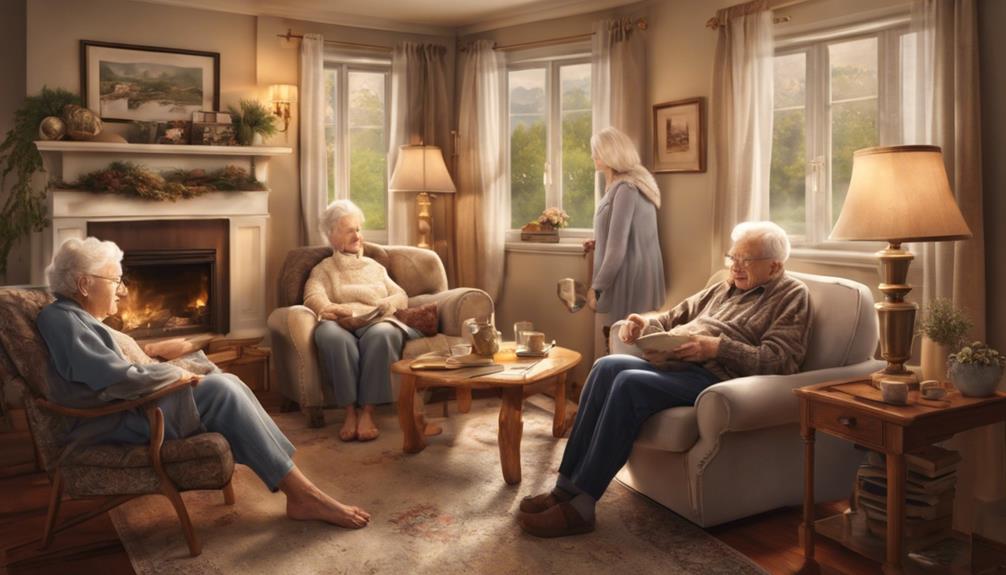
Incorporating storytelling into daily routines can enrich the lives of dementia patients by fostering connections and stimulating cognitive functions. Story sessions offer a wonderful opportunity for memory recall, allowing individuals to reminisce about past experiences and share personal stories. These sessions not only stimulate cognitive functions but also encourage social interaction, creating a supportive and engaging environment for individuals living with dementia.
Tailoring storytelling activities to individual interests is key to making the sessions more enjoyable and meaningful. By focusing on topics that resonate with each person, such as favorite hobbies or significant life events, we can enhance their engagement and emotional well-being. These personalized approaches help build connections and foster a sense of identity and belonging.
Furthermore, storytelling is a versatile activity that can be adapted to different cognitive levels and stages of dementia, ensuring that everyone can participate and benefit from this enriching experience. By embracing the power of storytelling, we can create moments of joy, connection, and cognitive stimulation for dementia patients in the comfort of their homes.
Puzzle Solving Time

Let's talk about the positive impact of puzzle solving on enhancing memory and cognitive skills for those dealing with dementia.
Engaging in puzzles not only stimulates the brain but also helps in developing problem-solving abilities.
It's truly remarkable how these activities can bring joy and a sense of accomplishment to individuals facing memory challenges.
Memory Boosting Puzzles
Engaging in memory-boosting puzzles is a valuable cognitive activity that can significantly enhance memory and problem-solving skills for individuals with dementia. Puzzle solving offers a stimulating and enjoyable way to exercise the brain, promoting cognitive function and memory care in those with Alzheimer's.
Here are some ways memory-boosting puzzles can benefit dementia patients:
- Improved Memory: Regularly engaging in puzzles can help slow down memory decline and enhance retention abilities.
- Enhanced Problem-Solving Skills: Solving puzzles challenges the brain, improving problem-solving skills and cognitive agility.
- Varied Challenge Levels: Different types of puzzles offer varying levels of difficulty, catering to individual cognitive abilities.
- Social Interaction: Puzzle solving can be a social activity, promoting engagement and connection between dementia patients and caregivers.
Cognitive Skills Development
As we move forward into exploring the cognitive skills development aspect of puzzle solving time, it's important to recognize the significant impact puzzles can have on memory and problem-solving abilities for dementia patients. Engaging in puzzle activities not only stimulates the brain but also promotes mental agility, which is especially beneficial for individuals with cognitive impairment.
Research indicates that puzzle solving can potentially delay cognitive decline and enhance overall brain function in people with dementia. Furthermore, completing puzzles can boost self-esteem and confidence in dementia patients by providing them with a sense of accomplishment.
Regular participation in puzzle solving sessions can play a crucial role in maintaining cognitive abilities and mental acuity in individuals facing the challenges of dementia.
Dance and Movement Classes

Dance and movement classes offer valuable benefits for dementia patients, including improved physical coordination, balance, and flexibility. Engaging in these activities at home can have a profound impact on the overall well-being of individuals with dementia. Here are four ways dance and movement classes can positively influence the lives of those with cognitive impairments:
- Enhanced Cognitive Function: Studies have demonstrated that participating in dance therapy can stimulate cognitive function and memory retention in individuals with dementia.
- Improved Social Interaction: Dance classes provide a platform for social engagement, fostering connections with others and reducing feelings of isolation.
- Boosted Emotional Well-being: Engaging in dance and movement activities can enhance mood, reduce stress, and promote self-expression, leading to an overall improvement in emotional well-being.
- Quality of Life: Dance therapy has been found to enhance the quality of life for dementia patients by offering a fun and engaging way to stay active and connected.
Aromatherapy Sessions
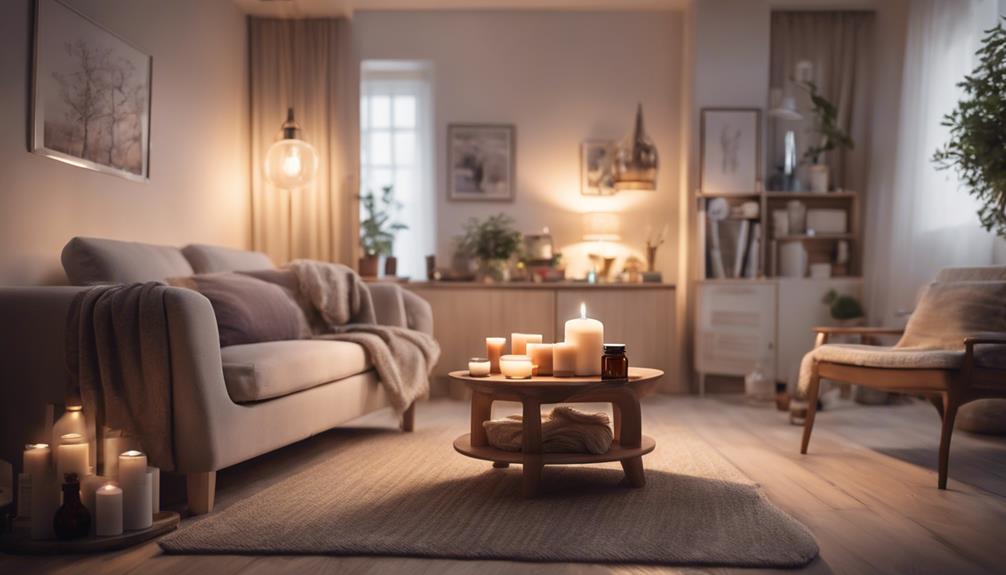
Utilizing essential oils to stimulate the sense of smell can offer calming and therapeutic benefits for dementia patients engaging in aromatherapy sessions at home. Aromatherapy, with scents like lavender or citrus, has been shown to promote relaxation and reduce anxiety in individuals with dementia. These sessions not only help improve mood and sleep quality but also enhance the overall well-being of dementia patients. It's crucial to ensure the proper dilution and safe use of essential oils during these sessions to prevent any adverse reactions.
Aromatherapy can be a soothing and therapeutic activity that enriches the sensory experience for dementia patients, creating a peaceful environment where they can relax and unwind. The power of scent is remarkable in evoking memories and emotions, making aromatherapy a valuable tool in caring for individuals with dementia. By incorporating aromatherapy into their routine, caregivers can provide a holistic approach to improving the quality of life for their loved ones.
Bird Watching Together

Engaging in bird watching together can foster a sense of connection with nature and provide a calming and engaging activity for dementia patients at home. Bird watching allows us to observe the beauty of different bird species, listen to their songs, and enjoy the peacefulness of the outdoors. Here are four ways bird watching can benefit dementia patients:
- Nature Connection: Watching birds in their natural habitat helps us feel more connected to the environment around us, promoting a sense of tranquility and harmony.
- Sensory Stimulation: The sights and sounds of birds provide sensory stimulation, engaging our senses and sparking moments of joy and curiosity.
- Mindfulness: Bird watching encourages us to be present in the moment, focusing on the beauty of the birds and their behaviors, which can help reduce stress and anxiety.
- Emotional Well-being: This activity can boost mood, evoke a sense of wonder, and create a peaceful and enjoyable experience for dementia patients, enhancing their overall emotional well-being.
Simple Card Games
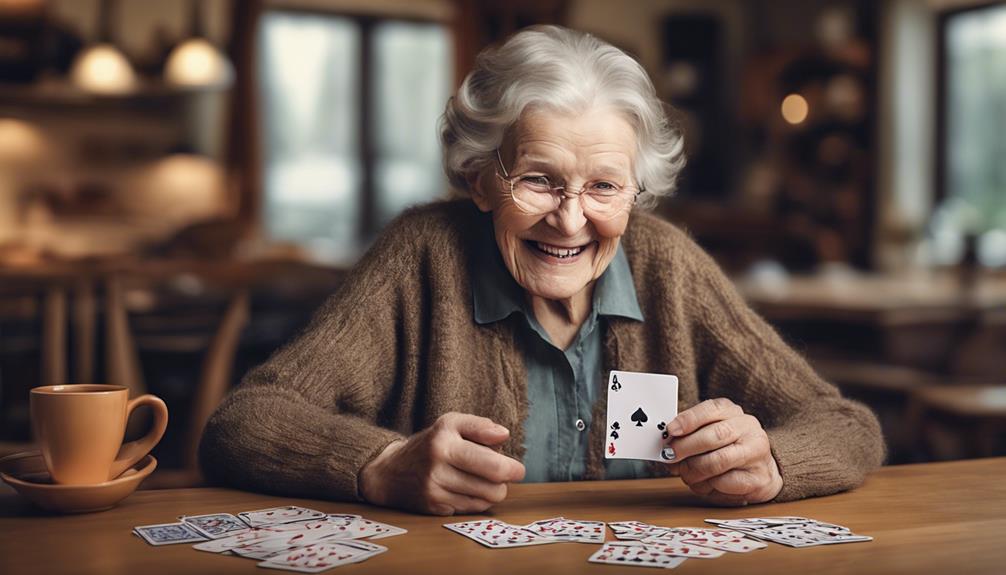
When looking for engaging activities to provide cognitive stimulation for dementia patients at home, simple card games like Go Fish, Memory, and Uno offer a beneficial and enjoyable option. These card games aren't only fun but also help improve memory, focus, and social interaction skills in individuals with dementia. Playing card games can serve as a meaningful way to spend quality time with our loved ones who are dealing with dementia. The simplicity of these games makes them easy to learn and adaptable to different skill levels, allowing for modifications based on varying degrees of cognitive abilities.
Engaging in card games on a regular basis can assist in maintaining mental sharpness and provide a sense of accomplishment for dementia patients. The social interaction that comes with playing these games can also help in fostering connections and creating moments of joy and shared experiences. Therefore, incorporating simple card games into daily routines can be a valuable addition to the care and support we offer to our loved ones with dementia.
Frequently Asked Questions
How Do You Keep a Dementia Person Busy?
We keep a dementia person busy by engaging them in simple tasks, stimulating activities, and providing a structured routine.
Encouraging participation in sensory experiences, cognitive challenges, and physical activities can help keep them occupied and promote well-being.
What Are 3 Things Not to Say to Someone With Dementia?
We should avoid saying phrases like 'You should remember this,' 'You're wrong,' or 'I already told you that' to someone with dementia as it can be frustrating, confusing, or cause distress.
Using simple language, avoiding complex explanations, and not pressuring them with too many questions is essential.
It's important to communicate compassionately and respectfully to support individuals living with dementia.
What Are the Indoor Activities for Adults With Dementia?
When considering indoor activities for adults with dementia, it's important to focus on engaging and stimulating options.
Activities like listening to music, looking at family photos, or participating in simple craft projects can provide enjoyment and cognitive stimulation. Reading together, solving puzzles, or playing memory games are also beneficial.
Additionally, sensory stimulation activities, personal care tasks, and kitchen-related activities can enhance well-being and create meaningful experiences for adults with dementia.
What Is the Number One Trigger for Dementia Behavior?
Understanding the underlying triggers of dementia behavior is crucial for effective management. Often, unmet needs and communication difficulties serve as the number one trigger for challenging behaviors in dementia patients. Changes in routine, environment, or caregivers can also play a significant role.
Conclusion
In conclusion, engaging dementia patients in various activities at home is crucial for their well-being and cognitive stimulation. By incorporating outdoor walks, sensory activities, memory scrapbooking, and more, we can provide them with mental challenges and social interaction that enhance their quality of life.
Stay tuned for more tips and ideas on how to create meaningful experiences for your loved ones living with dementia. Together, we can make a difference in their lives.
